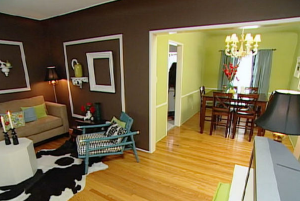Posted by Teresa on November 30, 2012 under Housing Trends, Landlord and Tenant FAQs | 
 Do you furnish your rental properties or have you ever considered it? What are the advantages and disadvantages? We’ve looked around and found that while the vast majority of landlords rent their properties without furnishings, some find that doing so gives them an advantage for a niche that works.
Do you furnish your rental properties or have you ever considered it? What are the advantages and disadvantages? We’ve looked around and found that while the vast majority of landlords rent their properties without furnishings, some find that doing so gives them an advantage for a niche that works.
Advantages of furnished rentals:
• Higher rent: In some areas, furnishing a rental property can as much as double the rent.
• Higher-end tenant: With the right location, amenities and furnishings, you could attract a higher-end tenant, such as relocating executives or long-term vacationers with money to spend on a nice place.
• You’re covered: Security deposits don’t usually include the value of the furnishings (that would be cost prohibitive for most tenants), but in case anything is damaged or needs to be replaced, your insurance policy should cover it. Check with your agent.
Disadvantages of furnished rentals:
• More headaches in the maintenance department. You’ll need to add cleaning, repairing and replacing furniture to your maintenance list.
• Inventory troubles: Documenting the condition of furnishings at move in and move out times will be added work. Consider that many furnished rentals also include dishes, kitchen tools and silverware, and you can see that keeping inventory could be tedious. More stuff means more things to go missing, too.
• Short-term tenants. Folks who are looking for furnished apartments are not usually long-term lease signers. They’re often starting a new job in a new place, starting over in their personal lives, or in a temporary living situation due to an emergency.
As with anything, if you invest too little in your furnishings, you’ll probably have to replace them more often. On the other hand, it doesn’t make sense to spend a lot on furniture, electronics and lighting that could be subject to abuse. Think about your target market. If you’re going for lower-income tenants, you won’t be able to afford expensive furnishings. If you’re targeting executive, vacation or high-end tenants, they will expect nice furnishings—and be willing to pay for them.
If you’d like to gauge the demand for furnished rentals in your area, talk to local real estate agents. They often specialize in corporate relocations, or could refer tenants who are buying in the area but haven’t found the right property yet.
Start your tenant relationship off right by knowing who you’re leasing to. Protect your rental property and assets with tenant background checks. Proper tenant screening will ensure you are leasing to the best possible tenants.
Posted by Teresa on November 28, 2012 under Landlord Tips | 
 You may not realize it, but you could be facing competition from an unknown entity. All over the country, scam artists are posing as landlords of buildings they don’t even own and preying on unsuspecting would-be tenants. One elderly woman in Maryland lost $5,000 to con artists.
You may not realize it, but you could be facing competition from an unknown entity. All over the country, scam artists are posing as landlords of buildings they don’t even own and preying on unsuspecting would-be tenants. One elderly woman in Maryland lost $5,000 to con artists.
In a tight rental market, people are more anxious about finding affordable rental housing. Scammers take advantage of their desperation—and willingness to let their guard down—to steal thousands of dollars that victims think is going to pay rent and security deposits. Soon, they discover that the “landlord” to whom they handed over their money is nowhere to be found. Typically, they have little recourse for recovering their funds or getting justice. The phony landlords simply vanish into thin air.
Scammers like this affect everyone. Most tenants have limited funds for rent and security deposits—so, when that money is gone, it won’t be replaced for months. Legitimate landlords miss out on the chance to lease to new tenants, and the victims are left scrambling to secure new housing—or become homeless.
How can this scam happen? Con artists search for homes for sale or rent online, and copy the information and photos to create “For Rent” listings on Craigslist and other websites, using their own contact information. When someone inquires, they say they are relocating and need to immediately rent out their home. If the house is for sale, they tell interested parties to ignore the sign in the front yard—they’ll be taking it down soon. Some even find ways to change the locks on the house so they can show it to unsuspecting victims. Others tell tenants they will get the keys after the security deposit is received.
These con artists are creative and convincing. It might be hard to understand how anyone could fall for a scam like this, but they do. Maybe some of your tenant applicants have fallen for these scams. Or maybe they’re getting ready to. As a responsible landlord, you can help prevent these con artists from getting away with their schemes—and help your future tenants save money so they can rent from you!
First, check Craigslist in your area to see if any of your rental properties are showing up under phony listings. And, when showing your rental properties or talking to applicants, be sure to mention that there are scam artists out there. If they are considering other properties, let them know that they need to do their due diligence:
• If there is a For Sale sign out front, call the agent on the sign and ask if the home is for rent.
• Never mail a security deposit to a random address or PO Box if you haven’t met the landlord and determined that they do indeed own the property.
• Check public records to see who owns the property.
• If the rent seems too good to be true, it probably is.
• If the “landlord” is in a hurry or pushing hard for a rent check or security deposit, something is probably wrong.
Going to a little extra effort could help stop these con artists from victimizing another innocent would-be tenant, so they can rent from you!
Posted by Teresa on November 17, 2012 under Landlord and Tenant FAQs, Landlord Tips | 
 In a multifamily rental property, conflicts can arise over seemingly mundane issues. Parking is one of them. When parking is limited, and tenants are restricted to a certain number of spaces, sparks can fly when they think “their” space is being trespassed upon.
In a multifamily rental property, conflicts can arise over seemingly mundane issues. Parking is one of them. When parking is limited, and tenants are restricted to a certain number of spaces, sparks can fly when they think “their” space is being trespassed upon.
Here are some helpful tips to keep parking disputes from causing big problems for you or your rental property manager:
- When enforcing your parking policy, remember that your tenants don’t own the spot or spots that go with their unit. You do.
- Depending on availability, limit each unit to one or two parking spaces. Leave the rest open for visitors and potential new tenants.
- You can require that a tenant household’s additional vehicles park in visitor spaces or on public streets surrounding the property.
- Don’t allow tenants to “trade” spaces among themselves. For example, if Unit A has one car and two assigned spaces, and Unit B has three cars and two assigned spaces, it might seem reasonable to allow B to use A’s extra space. But this can get complicated. Other tenants will see the three cars and wonder why they are limited to two. When tenant A moves out, the next tenant may need both spaces. People tend to think something “belongs” to them after they use it for a while. And if tenants have disagreements, the parking spots could become a contentious issue. You don’t want to give tenants reasons to disagree.
- Consider having inexpensive decals made for residents to affix to their bumpers, so you can easily identify cars the do and do not belong on your property.
- Be sure to enforce rules against parking in front of dumpsters, along fire lanes and in handicapped spaces. It’s a good idea to give first-time violators a written warning. After that, tow any vehicles that are parked illegally, at the owner’s expense.
- You are entitled to prohibit non-operating vehicles from your property, along with oversize vehicles, recreational vehicles, boats, trailers, etc.
Set clear policies and include them with your lease. Have tenants sign off or initial the page to prove that they have read and understand the policy.
Start your tenant relationship off right by knowing who you’re leasing to. Protect your rental property and assets with tenant background checks. Proper tenant screening will ensure you are leasing to the best possible tenants.
Posted by Teresa on November 14, 2012 under Landlord Tips, Legal | 
 If you’re a new real estate investor—having purchased property to rent out in 2012—you may qualify for special tax breaks on improvements. But you’ll have just a few months to make them.
If you’re a new real estate investor—having purchased property to rent out in 2012—you may qualify for special tax breaks on improvements. But you’ll have just a few months to make them.
Many new landlords jumped into the business this year, as prices dropped and demand rose. Vacancies are down throughout the country, and rents have been projected to stay stable for the next few years. For lots of investors, 2012 was a good year to get into the real estate rental market.
Attracting quality tenants is perhaps the most important thing to learn for new landlords. But what do good tenants want? In most cases, they want to feel comfortable and safe. For higher-end properties, they also want amenities like wood floors, tile bathrooms, gas fireplaces and upgraded appliances.
If you’re a new landlord thinking of making improvements to your property, ask your tax advisor about the IRS Bonus Depreciation of “personal property improvements” and Increased Section 179 Deduction. Briefly, this section of the tax code allows businesses to write off most or all of the purchase price of qualifying equipment and depreciate updates made in the first year of ownership, with certain limitations and restrictions. It was enacted after 9/11 to encourage businesses to invest in themselves.
December 31 2012 is the deadline; new landlords could qualify for breaks on improvements if they move fast. Some improvements, such as cabinets or new tubs, don’t qualify because they are part of the property. But new appliances, floor coverings, fixtures and paint could qualify—and could help you compete for the best tenants.
Of course, it’s always wise to consult a tax expert BEFORE spending any money that you think you’ll be able to deduct as an expense or depreciate.
Disclaimer:
The contents of this article are intended for general information purposes only, and should not be relied upon as a substitute for obtaining financial or tax advice applicable to your situation. Please consult your tax advisor.
Posted by Teresa on November 7, 2012 under Landlord and Tenant FAQs, Lease and Rental Agreements | 
 A landlord recently asked if her tenant, who claimed her roommate had abused her, would be allowed to break her lease.
A landlord recently asked if her tenant, who claimed her roommate had abused her, would be allowed to break her lease.
Good question! Many abuse victims do not feel safe in their homes, even with protective orders against their abusers. Others, as in the case above, actually live with their abusers. In either case, the desire to move can be strong—even if it means breaking a lease. Should victims of domestic abuse be allowed to get out of a lease before it is up? Should penalties be waived? And who should carry the financial burden, the tenant, his or her roommates, or the landlord?
The first thing a landlord should do is to check state laws, and if applicable, any local statutes that cover domestic abuse and tenant rights. Under most landlord-tenant laws, the tenant cannot be excused from paying rent when he or she breaks a lease before it expires. In some places, the landlord is not required to re-lease the unit, and the tenant is responsible for rent until the end of the lease. In others, the landlord has a duty to attempt to re-lease the rental unit.
Many states have passed legislation giving domestic abuse victims the right to break a lease without penalty or paying future rent. They include New York, New Jersey, Oregon, Washington, Minnesota, North Carolina and others. Check your state’s landlord-tenant laws to determine whether it has passed such legislation. Many require the victim to notify the landlord of intention to terminate the lease. The required notice may be 30 or 60 days. Some require proof of abuse, such as a protective order or police report.
Most landlords realize that having a domestic violence situation on their property is not good. But it’s also true that tenants who move out before their leases are up cause financial hardships. Certain states make it easier on the landlord by requiring the vacating tenant to pay rent for the month in which they leave. In others, they are required to pay two months’ rent.
If you receive such a notice from a tenant, check your states law and proceed accordingly.
 Do you furnish your rental properties or have you ever considered it? What are the advantages and disadvantages? We’ve looked around and found that while the vast majority of landlords rent their properties without furnishings, some find that doing so gives them an advantage for a niche that works.
Do you furnish your rental properties or have you ever considered it? What are the advantages and disadvantages? We’ve looked around and found that while the vast majority of landlords rent their properties without furnishings, some find that doing so gives them an advantage for a niche that works.



